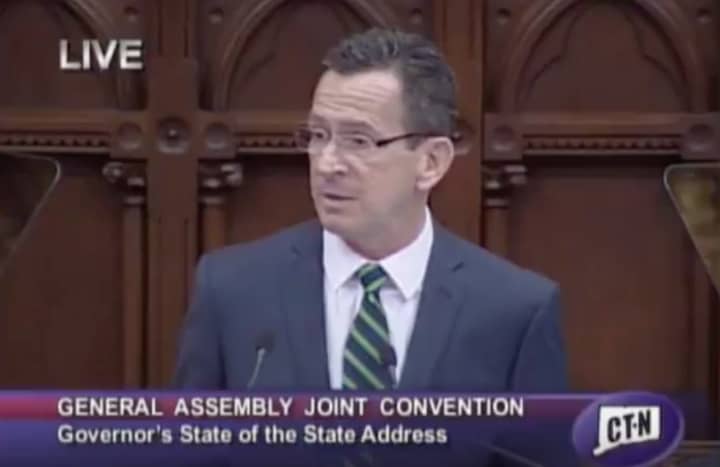He made the 30-minute noontime speech at the General Assembly joint convention as the legislature opened its new session.
Some of the news Wednesday was bad: Malloy's proposed budget includes $569 million in cuts, a reduction of 5.75 percent. It also includes the layoffs of thousands of state employees.
“Friends, as we embark on another legislative session, my message to you is this: Connecticut is not going back to that pre-recession reality. It just doesn't exist anymore,” Malloy said.
During his talk he outlined five budget principles that he said will make the state’s budget “more predictable, more sustainable, and more transparent.”
The first principle is based on the idea that Connecticut needs to stop taking a “current services” approach to the way it creates budgets.
“’Current services’ is a term readily understood in this building, but it is a foreign concept to our constituents. Essentially, it means that we wrongly assume government can do everything it does now, regardless of ever-growing costs. It just isn’t sustainable,” Malloy said.
Malloy said the budget adjustments he submitted to the legislature are based on actual revenue projections.
“In other words, this budget is based not on how much we want to spend, but how much money we actually have to spend,” he said. “This new method will require different decisions to keep government living within its means and it won’t come without sacrifice – it will require the reduction of the state workforce by more than a thousand employees through attrition and other means.”
Malloy said he also wants to enact a spending cap to keep the state’s spending in check.
The second principle the governor outlined had to do with unfunded obligations such as pension and retirement costs for state employees. He said that these costs mean the state will face a fiscal cliff in 2032. He has instructed Office of Policy and Management Secretary Ben Barnes to meet with the treasurer, comptroller and state employees and discuss how to make the pension system more affordable and sustainable. Malloy will also continue negotiating with 13 state employee bargaining units to discuss salaries and other cost issues.
In his third principle, Malloy said that every line item in the state’s budget cannot be considered a core service. He said the state is obligated to maintain public safety, social security, a strong economy, the environment, education and justice, but that other earmarks will have to be looked at more closely.
“We have to reform our earmark process. That includes state funding to outside agencies, community organizations and special events. Funding for these items should be time-limited, and we should re-examine these expenditures on a regular basis.”
He said his budget cuts include reducing existing earmarks by 20 percent, and that any state funding that falls outside core government services should be based on merit.
His fourth principle had to do with holding state agencies accountable to the public and making them transparent.
The bill I submit to you today will require agencies to post online detailed, meaningful, timely information about how they are spending the people’s money, and precisely what that money is accomplishing,” he said. “And, at the same time we’re making agency budgets more transparent, we also need to push commissioners to find more cost-effective ways of accomplishing their respective missions.”
In his final principle, Malloy pushed for legislators to not wait until the end of the session to pass a budget. He also called on lawmakers to be willing to compromise and to support a final budget.
“We can’t be opposed to tax increases, but unwilling to cut the spending those taxes support. We can’t be for reigning in spending, but oppose cuts in any one line item. We must be honest about the challenges we face, and work on them together.”
Click here to follow Daily Voice New Canaan and receive free news updates.


